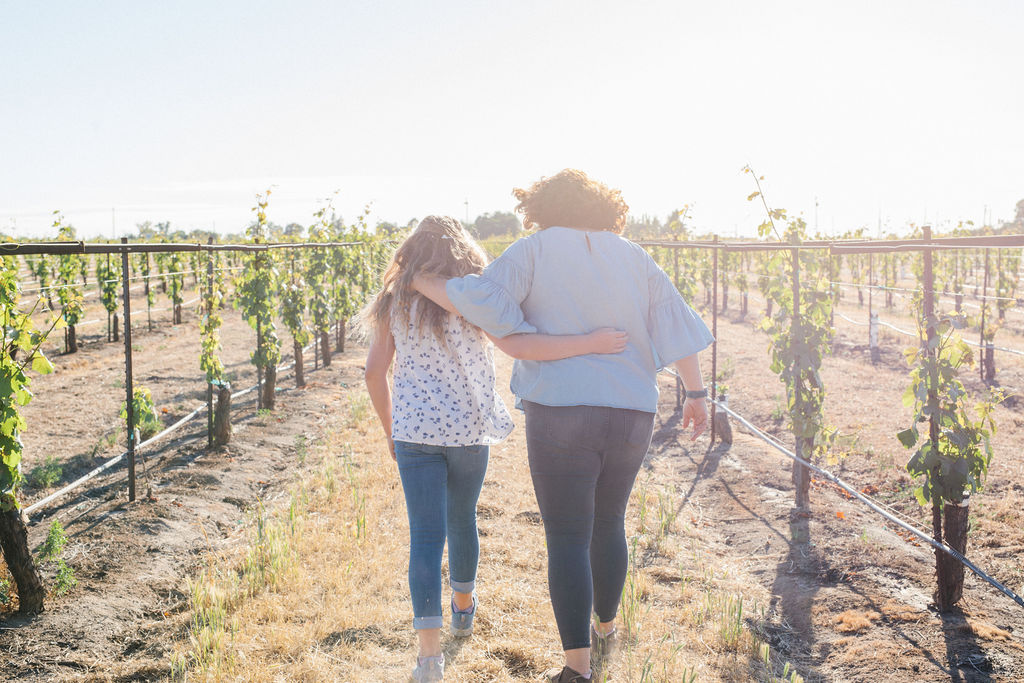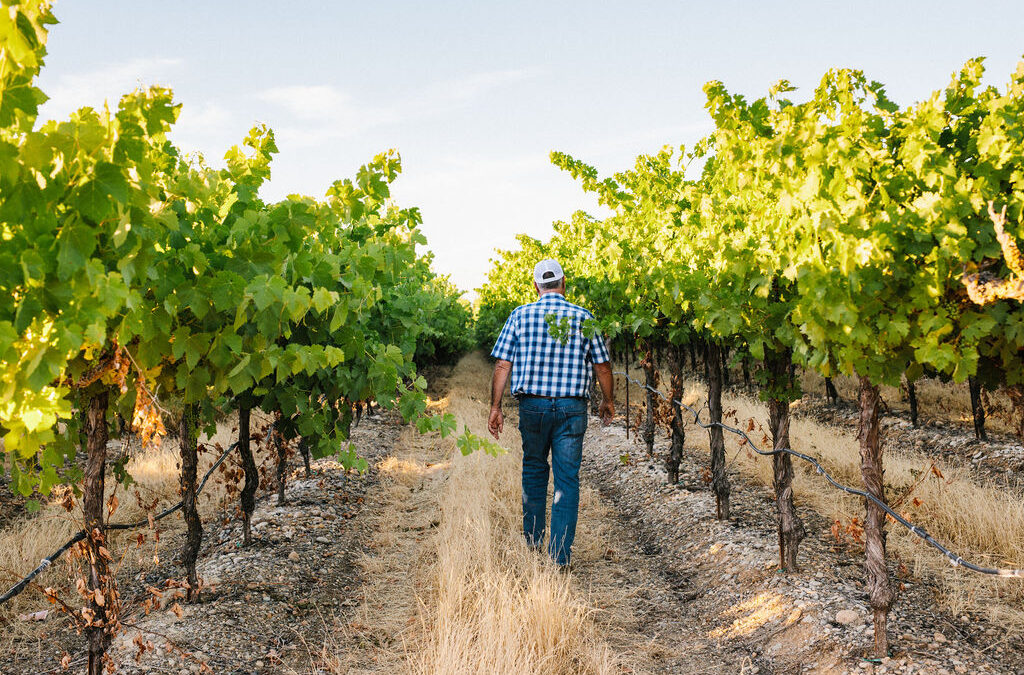MONDAY, MARCH 25, 2024. BY MISTY OEBEL, MS, FARM STRESS EDUCATOR, MICHIGAN STATE UNIVERSITY EXTENSION.
The concept of resiliency is fascinating. In my role as a Farm Stress Educator, I observe daily and chronic stressors as I work with growers, and I am aware of how it impacts individuals and families. We often spend time with families in crisis, and I am consistently amazed when I see how some bounce back from very difficult situations. When the suicide rate for growers is the fourth highest by occupation in the United States, and farmers die from stress-related causes at disproportionate numbers, I want to know what contributes to recovery for some while others struggle.
Resiliency is often viewed as an inherent trait, but it is an ability that can be fostered. As we have studied it, we’ve found that resilient people prepare themselves for crises before they occur. They are proactive in creating good habits across the spectrum of health and maintaining balance across this holistic approach to wellness. They recognize that it is very difficult to develop these skills during a crisis situation, and they will need to rely on these habits to get them through tough times. We also find that for those who are dealing with events beyond their control, healthy habits allow them to regain a sense of peace when they might otherwise feel lost. Resilient people adapt stress management methods to their needs because there isn’t a one-size-fits-all method of dealing with stress. Instead, having good habits across all dimensions of health allows us to better handle stress as it occurs. Katherine Ponte identified eight dimensions of wellness in 2020, and I’d like to discuss ways that growers can increase their health in each area.
Physical Wellness
Physical health is the first area we consider when we discuss wellness. It seems appropriate, as it’s the area of health most of us are comfortable thinking about and addressing. We are taught from a young age that we should eat fruits and vegetables, drink water, and strive to incorporate movement into our regular schedule. When I discuss stress levels with growers, I ask about their exercise habits, and I’m often told that their work provides enough physical activity.
Although having an active job certainly helps with maintaining physical health, adding activity into your day that you enjoy, and that is not related to your occupation, is important to physical wellness.
Exercise decreases stress by as much as 30% and decreases stress hormones in the body while also increasing endorphins, so physical activity is a great way to decrease our stress levels. Try to find the activity you enjoy. If you don’t enjoy running, try hiking. If you don’t like strength training, try Pilates. There are many ways to enjoy movement and increase the benefits of it in your life.

Lodi Winegrape Commission Board Chairman, Diego Olagaray (pictured far right) and his brother, grower Frank Olagaray (front left), frequently go for fun and challenging bike rides. This 30-mile trek was on the Summer Solstice and included a gorgeous ride through Delta farmland. Photo taken by Stephanie Bolton, who hopes to one day be able to ride with these legends without the big battery power of the ebike.
Intellectual Wellness
Just as our physical bodies need to stretch, so does our brain. Pursuing creative outlets and opportunities to continue learning allows our brains to remain sharp and quick to respond, and diminishes the effects of aging. Reading, writing, drawing, and puzzles…these are all excellent ways to maintain your intellectual health. Again, remember that finding ways to make it fun means that you are more likely to continue the activity. There are a lot of apps for your phone that feel like games but force your brain to work. Creative outlets are also important to our intellectual health, and a form of self-care that is often overlooked. Not everyone is artistic, but perhaps you enjoy problem-solving or inventing a new tool to complete a task. These kinds of activities help maintain our brain health.
Financial Wellness
The American Psychological Association found that in 2023, finances remain the greatest source of stress for adults in the United States. Due to inflation, lower demand, and more competition, finances can be particularly stressful for growers. The good news is that if money is the top source of stress for many of us, then developing better habits in this one area can significantly decrease a major source of our stress. There are many resources to do this, including online programs, community college classes, financial advisors, workbooks, workshops, and services through Cooperative Extension programs with universities.
Environmental Wellness
Environmental health is as simple as it sounds: spend time outside. Fresh air, sun, plants – these all contribute to our environmental well-being. Many growers feel that they spend enough time outside during their work hours, and don’t always prioritize spending time outside resting or doing activities that bring them joy. But if all your time in nature is spent working, the great outdoors becomes just an office space and a source of stress. To increase our environmental health, we must make the time to take a walk, play with the dog, or sit on the porch. Find time outside, away from your work. Instead of having a picnic in your vineyard, try finding an alternate outdoor location that feels restful or fun to you.
 A serene spot at Timber Cove for a picnic of fresh oysters and refreshing Lodi wine, with no vineyards in sight. Photo by Stephanie Bolton.
A serene spot at Timber Cove for a picnic of fresh oysters and refreshing Lodi wine, with no vineyards in sight. Photo by Stephanie Bolton.
Spiritual Wellness
In a comprehensive approach to wellness, we consider the human need to feel connected to something larger than ourselves. While there does not appear to be a connection between this form of health and a specific religion or practice, I would encourage you to find what brings you a sense of peace, purpose, and meaning. For some, it is meditation. For others it is prayer. Many find peace by participating in services at a house of worship, while others find it when they spend time outside or when they volunteer. It can be valuable to take the time to discover what makes you feel grounded and at peace.
Social Wellness
When we consider resiliency, we find that social connection and community are the most important influences on how one will respond to a crisis. Feelings of isolation and loneliness lead to increased depression, anxiety, cardiovascular issues, and suicidal ideation. Loneliness can be dangerous when we are experiencing hard times. Humans are social beings, and we need connection. We not only need to feel like others understand us, but we need to observe how others recover from hard times. It encourages us and gives us hope. To build community, we need to prioritize time spent with friends and family and be open to forging new relationships.
 Lodi grower Madelyn Kolber walks through the vineyard with daughter Sadie.
Lodi grower Madelyn Kolber walks through the vineyard with daughter Sadie.
Occupational Wellness
Occupational well-being tends to be one of the hardest areas of health for growers to develop and maintain. It is as simple as maintaining work and life balance, but for many of us, that balance is difficult to achieve. When the weight of a business is on your shoulders, it can be hard to prioritize breaks and rest during the day. Additionally, our bodies can be forced to go for long periods of time with very little rest, and this tricks us into believing we are doing okay. Although the human body will function for long periods of time under these circumstances, it will not do so with maximum productivity or safety. Without opportunities to rest and reset, our brains become sluggish, and our reflexes are dulled. Depending on the work we are doing, it can become dangerous for us to work. It’s important to prioritize taking breaks throughout our day and to take extended time away from our work. These rests allow us to reset and refocus. As we take breaks, it also allows us the opportunity to remember the purpose behind our work, which helps us to fight off burnout.
Emotional Wellness
Emotional health is often prioritized the least. Some of us are uncomfortable in dealing with emotions, and others may feel that self-care is selfish. Our emotional well-being is important because it often impacts other areas of health and will affect our relationships with others, our occupational satisfaction, and our physical health. Recognizing its importance, there are many ways that we can improve our emotional wellness. We can find it through communication and connection with others. We can incorporate simple mindfulness activities that will allow us to be present in the moment and engaged with our emotions as they occur. It’s important to recognize our emotions and process them, rather than pushing them down. Emotions don’t go away. They can become an itch that isn’t being scratched, and they will continue to build until we are forced to deal with an overwhelming wave of emotion. At that point, our feelings may also manifest as other secondary emotions, most commonly anger and irritation. This emotion is often preferred over other uncomfortable emotions because it can sometimes feel empowering. Anger can be a great motivator for change and even justice, but we need to be aware that it is also detrimental to our long-term physical and social health. The other danger in allowing our emotions to build in this way is that we begin to feel that they are out of our control. By practicing mindfulness and allowing ourselves to process emotions as they occur, we are able to retain control of our feelings and our responses.
Final Thoughts
If you are interested in increasing your resiliency, it is useful to look at ways to improve your health in all eight dimensions of wellness. Consider carefully what you are doing well, and which areas would benefit from better habits. If you find yourself in crisis, please remember that you are not alone and if you are thinking of ending your life, tell someone who can help or call the 988 Suicide and Crisis Lifeline (dial 988 or visit HERE). If you are interested in knowing more about how to help others in your community, consider becoming certified in Mental Health First Aid. This training prepares you to recognize and respond to signs of mental health challenges or crises. This training is available through many local behavioral health resources, but it’s also available through Michigan State University HERE.
As a grower, you take care of your land, you prune your vines, and you maintain your equipment. It’s important to remember that you are the most important tool in your operation and your maintenance is also worth investing in.
Misty Oebel gave an incredible talk on this important topic at the 2024 Unified Wine & Grape Symposium during the “Viticulture X Games: Extreme Weather Winegrowing” session and kindly adapted her talk into a guest blog post.
Have something interesting to say? Consider writing a guest blog article!
To subscribe to the Coffee Shop Blog, send an email to stephanie@lodiwine.com with the subject “blog subscribe.”
To join the Lodi Growers email list, send an email to stephanie@lodiwine.com with the subject “grower email subscribe.”
To receive Lodi Grower news and event promotions by mail, send your contact information to stephanie@lodiwine.com or call 209.367.4727.
For more information on the wines of Lodi, visit the Lodi Winegrape Commission’s consumer website, lodiwine.com.
For more information on the LODI RULES Sustainable Winegrowing Program, visit lodigrowers.com/standards or lodirules.org.


